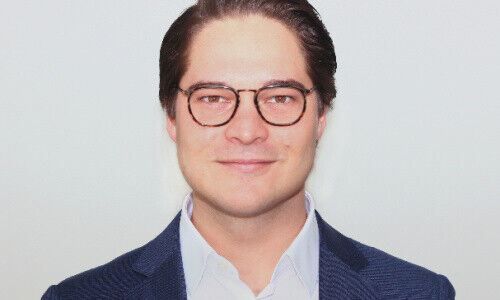In the hunt for yields, insurers are challenging banks in the mortgage market. Due to regulatory requirements, banks are fighting with unequal weapons in this area, Philipp Kaupke writes in an essay for finews.first.
This article is published on finews.first, a forum for authors specialized in economic and financial topics.
Not only banks but also insurers are looking for ways to invest their funds profitably. The focus here is on mortgages. In the hunt for revenue, the cards are unevenly distributed between banks and insurers.
In their need to generate returns, insurers are becoming direct competitors of retail banks. In doing so, they have a decisive advantage. Insurers benefit from the fact that they can count on excess cash on their balance sheet side and are freer to use their assets than banks, which are subject to cost-driving capital requirements.
At the same time, banks are dependent on income from investment products, as their traditional business areas, accounts, and debit cards, hardly yield any returns. The imbalance is exacerbated by the growing number of competitors and the increasing comparability of investment products on the internet. As a result, prices and margins are falling.
«The banks' hands are tied here»
Competition in the mortgage business is hitting banks particularly hard. Insurers see mortgages as an attractive business model with which they can retain existing customers and «pick up» new ones.
The banks' hands are tied here. The Swiss National Bank's capital requirements, which are simultaneously fueling the mortgage market with negative interest rates, are making it difficult for the banks to expand this lucrative business, which generates up to 50 percent of their returns.
People who invest their money in a 3a-fund, for example, generally remain loyal to the bank. It is understandable that insurers today also offer such pension products. Although 3a-funds are still a developing market for insurers, the pressure on banks is increasing here as well.
Costs of 100 basis points and more for 3a-fund accounts are almost impossible to enforce on the market today. While older customers tend to remain loyal to the bank, younger customers are turning to cheaper providers. As a result, banks successfully developed apps with low costs for their maintenance. Examples of this are «Frankly» from Zuercher Kantonalbank (ZKB), or «Viac», a fintech that cooperates with WIR Bank as a custodian bank.
«The magic word is ecosystems»
The market for classic investment funds is also on the move. Swiss Life and other insurers have already gained a foothold here. In contrast to the mortgage market, however, insurers play a sub-ordinate role here today. But the potential for further growth in the coming years is there, as they have sufficient in-house expertise with their asset management to increase premium and customer funds.
Numerous insurers are also looking to enter fintech start-ups. With this not particularly innovative approach, they are trying to minimize the risk of being left behind technologically. In doing so, they are increasing the pressure to innovate on the sometimes-sluggish retail banks, which lack the free capital to make such commitments.
All the movement in the market has to do with distribution. Banks have traditionally been some-what-sluggish here, while insurers are adopting flexible approaches. For example, with cooperation – always with the aim of obtaining as many touchpoints as possible with potential customers. The magic word here is «ecosystems».
«Banks are in a Catch-22-Situation»
Moneypark.ch and the online comparison service Comparis, for example, offer independent solutions from a single source for topics such as retirement planning, housing, and buying a house. Insurers, banks, and other service providers work together in these online ecosystems. In this way, they reach people with whom they would have no thematic contact elsewhere.
It is often insurance companies that are behind these platforms – in the case of MoneyPark, one of the largest mortgage brokers, it is the insurer Helvetia. Some banks can already be found on these platforms today, but they play a secondary role. The reason: Compared with other providers, they can't keep up in terms of price.
Banks are in a Catch-22-Situation in these ecosystems as they present themselves today. Due to regulatory requirements, they have no chance of breaking the vicious circle with lower prices. They do have a chance if they focus on customer value. This includes, for example, the possibility of linking investments with price discounts when using other bank products or upgrading mort-gage products with additional services.
«There is no way around the banks making their offers more flexible»
One way of doing this is to make the mortgage product range more variable by offering flexible additional services. Basellandschaftliche Kantonalbank and SoBa-Bank already offer this in some parts, for example with modular mortgages that include an interest rate guarantee or options for early repayments. It is important that the banks focus on services that add value for the customer.
These services must be considered in the product design from the outset and anchored in a modular way. In this way, the bank can respond to the customer's individual needs during the discussion and customize the mortgage.
What exactly the customer wants can be identified in the customer discussion.
Finally, the banks should consider building up their own ecosystems around mortgages due to their regional pioneering position, which includes related topics such as property valuation, renovation, taxes, inheritance, follow-up mortgages and sales.
The fact is: there is no way around the banks making their offers more flexible in line with customer needs. The next few years will show whether they will succeed in playing to their strengths or whether they will lose some of their business.
Philipp Kaupke is a partner at Simon-Kucher & Partners, an international strategy & marketing consultancy.
Previous contributions: Rudi Bogni, Peter Kurer, Rolf Banz, Dieter Ruloff, Werner Vogt, Walter Wittmann, Alfred Mettler, Robert Holzach, Craig Murray, David Zollinger, Arthur Bolliger, Beat Kappeler, Chris Rowe, Stefan Gerlach, Marc Lussy, Nuno Fernandes, Richard Egger, Maurice Pedergnana, Marco Bargel, Steve Hanke, Urs Schoettli, Ursula Finsterwald, Stefan Kreuzkamp, Oliver Bussmann, Michael Benz, Albert Steck, Martin Dahinden, Thomas Fedier, Alfred Mettler, Brigitte Strebel, Mirjam Staub-Bisang, Nicolas Roth, Thorsten Polleit, Kim Iskyan, Stephen Dover, Denise Kenyon-Rouvinez, Christian Dreyer, Kinan Khadam-Al-Jame, Robert Hemmi, Anton Affentranger, Yves Mirabaud, Katharina Bart, Frédéric Papp, Hans-Martin Kraus, Gerard Guerdat, Mario Bassi, Stephen Thariyan, Dan Steinbock, Rino Borini, Bert Flossbach, Michael Hasenstab, Guido Schilling, Werner E. Rutsch, Dorte Bech Vizard, Adriano B. Lucatelli, Katharina Bart, Maya Bhandari, Jean Tirole, Hans Jakob Roth, Marco Martinelli, Thomas Sutter, Tom King, Werner Peyer, Thomas Kupfer, Peter Kurer, Arturo Bris, Frederic Papp, James Syme, Dennis Larsen, Bernd Kramer, Armin Jans, Nicolas Roth, Hans Ulrich Jost, Patrick Hunger, Fabrizio Quirighetti, Claire Shaw, Peter Fanconi, Alex Wolf, Dan Steinbock, Patrick Scheurle, Sandro Occhilupo, Will Ballard, Nicholas Yeo, Claude-Alain Margelisch, Jean-François Hirschel, Jens Pongratz, Samuel Gerber, Philipp Weckherlin, Anne Richards, Antoni Trenchev, Benoit Barbereau, Pascal R. Bersier, Shaul Lifshitz, Klaus Breiner, Ana Botín, Martin Gilbert, Jesper Koll, Ingo Rauser, Carlo Capaul, Claude Baumann, Markus Winkler, Konrad Hummler, Thomas Steinemann, Christina Boeck, Guillaume Compeyron, Miro Zivkovic, Alexander F. Wagner, Eric Heymann, Christoph Sax, Felix Brem, Jochen Moebert, Jacques-Aurélien Marcireau, Ursula Finsterwald, Claudia Kraaz, Michel Longhini, Stefan Blum, Zsolt Kohalmi, Karin M. Klossek, Nicolas Ramelet, Søren Bjønness, Gilles Prince, Salman Ahmed, Peter van der Welle, Ken Orchard, Christian Gast, Jeffrey Bohn, Juergen Braunstein, Jeff Voegeli, Fiona Frick, Stefan Schneider, Matthias Hunn, Andreas Vetsch, Fabiana Fedeli, Marionna Wegenstein, Kim Fournais, Carole Millet, Swetha Ramachandran, Brigitte Kaps, Thomas Stucki, Neil Shearing, Claude Baumann, Tom Naratil, Oliver Berger, Robert Sharps, Tobias Mueller, Florian Wicki, Jean Keller, Niels Lan Doky, Karin M. Klossek, Johnny El Hachem, Judith Basad, Katharina Bart, Thorsten Polleit, Bernardo Brunschwiler, Peter Schmid, Karam Hinduja, Zsolt Kohalmi, Raphaël Surber, Santosh Brivio, Mark Urquhart, Olivier Kessler, Bruno Capone, Peter Hody, Andrew Isbester, Florin Baeriswyl, and Michael Bornhaeusser, Agnieszka Walorska, Thomas Mueller, Ebrahim Attarzadeh, Marcel Hostettler, Hui Zhang, Michael Bornhaeusser, Reto Jauch, Angela Agostini, Guy de Blonay, Tatjana Greil Castro, Jean-Baptiste Berthon, Marc Saint John Webb, Dietrich Goenemeyer, Mobeen Tahir, Didier Saint-Georges, Serge Tabachnik, Vega Ibanez, David Folkerts-Landau, Andreas Ita, Teodoro Cocca, Michael Welti, Mihkel Vitsur, Fabrizio Pagani, Roman Balzan, Todd Saligman, Christian Kaelin, Stuart Dunbar, Carina Schaurte, Birte Orth-Freese, Gun Woo, Lamara von Albertini, Philip Adler, Ramon Vogt, Gérard Piasko, Andrea Hoffmann, Niccolò Garzelli, Darren Williams, Benjamin Böhner, Mike Judith, Gregoire Bordier, Jared Cook, Henk Grootveld, Roman Gaus, Nicolas Faller, Anna Stünzi, Philipp Kaupke, Thomas Höhne-Sparborth, Fabrizio Pagani, Taimur Hyat, Ralph Ebert, Guy de Blonay, Jan Boudewijns, Beat Wittmann, Sean Hagerty, Alina Donets, Sébastien Galy, Lars Jaeger, Roman von Ah, Fernando Fernández, Georg von Wyss, Stéphane Monier, Stefan Bannwart, Andreas Britt, Frédéric Leroux, Nick Platjouw, and Rolando Grandi.































